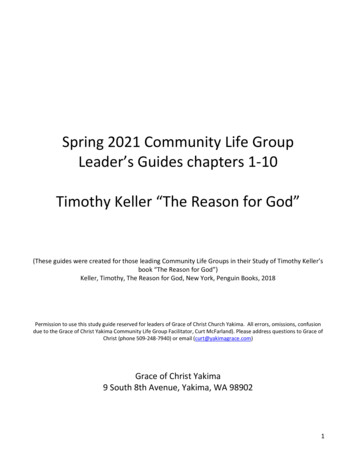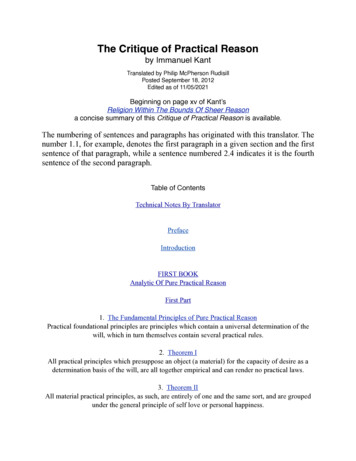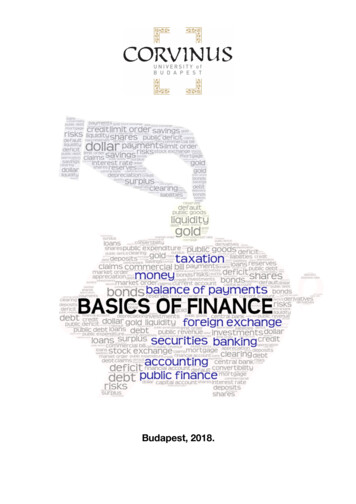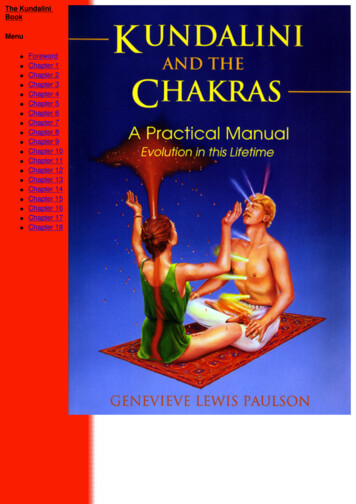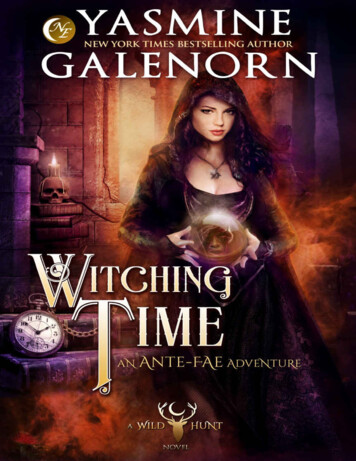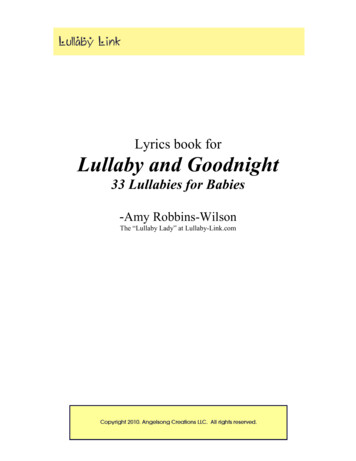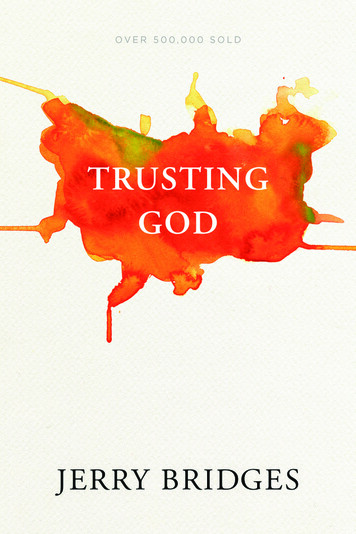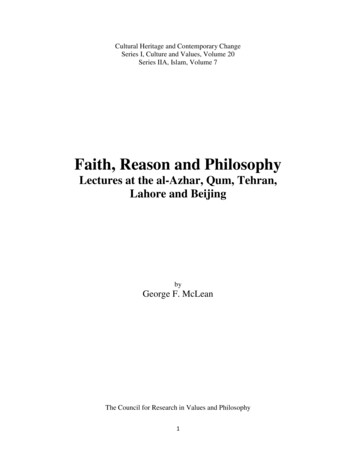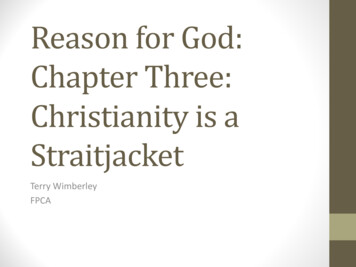
Transcription
Reason for God:Chapter Three:Christianity is aStraitjacketTerry WimberleyFPCA
Absolute Truth & Freedom Is absolute truth the enemy of freedom? Many think so. Many churches bar no-conformers to Christian doctrine –leading observers to believe these churches are anti-freedom. Christianity is also seen as culturally constrained andintolerant of diversity of thought. Finally some see Christianity – especially in its more “cultish”forms – effectively enslaving people.
The Nature of True Freedom Freedom means finding our own way in life.Freedom is discovering each of our purposes.Freedom is individually creating our own meaning.To some observers, Christianity is a threat go freedombecause it: Requires following “the way” of Christ – not “our way.” Involves discovering God’s purpose for us and Discovering the meaning of our lives as creatures of God.
All Truth is a “Power Play” Truth is a metanarrative constructed by the elite to controlpeople. Truth is used to exert power over other people. If you eschew the pursuit of truth as illegitimate - since “truth”is just a tool for power - then the very statement “All Truth is aPower Play” becomes your truth and is or is not illegitimatedepending on your perspective. To see through everything is to not see at all.
Requirements of ChristianCommunity Christian community can’t be completely inclusive (as far asshared beliefs are concerned). Church as community requires a proscribed set of beliefs andvalues. The concept of the modern progressive or “liberal” democracypostulates a completely inclusive society for which there islittle room for “exclusive” groups or organization. The problem is that the concept of “inclusive” defined byproponents of such democracies is in fact a highly defined and“exclusive” of values (like Christian values) that contradicttheir definition of ”inclusivity.”
Corporate Identity “Any community that did not hold its members accountablefor specific beliefs and practices would have no corporateidentity and would not be a community at all.” Christian communities should ask of the larger secular societywhich community exhibits better values for the inclusion andwell-treatment of people than Christianity? They should also ask which communities do more todemonized, separate and marginalize people? Christian communities can be found that both elevate andinclude and demonize and exclude. We like to think that Christian communities grounded in thetheology and ethics of Christ serve as welcoming and enablingcommunities.
Enemy of Pluralism andMulticulturalism? Is Christianity the enemy of pluralism and multiculturalism? Sometimes “yes” and sometimes “no.” Christianity, however is multicultural to a remarkable degreeas it is growing worldwide in many diverse cultures. Kellor thinks in part this happens because Christianity isinclusive of supernaturalism – something spurned in morerationalistic societies but valued in many, many other culturalsettings. Redeemer Church in NYC is an example of Christiancommunity attempting to adapt and explain itself in a veryrationalistic, highly educated community
Diversity At The Council ofJerusalem Acts 15: 2 And all the assembly kept silence; and they listened toBarnabas and Paul as they related what signs and wonders God haddone through them among the Gentiles. 13 After they finishedspeaking, James replied, “Brethren, listen to me. 14 Simeon hasrelated how God first visited the Gentiles, to take out of them apeople for his name. 15 And with this the words of the prophetsagree, as it is written, 16 ‘After this I will return, and I will rebuild the dwelling of David,which has fallen; I will rebuild its ruins, and I will set it up,17 that therest of men may seek the Lord, and all the Gentiles who are called bymy name,18 says the Lord, who has made these things known from ofold.’ 19 Therefore my judgment is that we should not trouble those of theGentiles who turn to God, 20 but should write to them to abstainfrom the pollutions of idols and from unchastity and from what isstrangled and from blood.
Cultural Diversity is Built Intothe Christian Faith From the outset Christianity has been expansive to all peopleand all cultures. Biblical text such as Isaiah 60 and Revelation 21-22 depict aworld where we are one but still retain our culturaldifferences. Christianity is not a Western religion that necessarily destroyslocal cultures (although in its worst forms (e.g. America’sIndian schools) it has). Christianity assumes more culturally diverse forms thanvirtually any other religion.
Freedom Isn’t Simple Ostensibly Christianity constrains our freedom to choose forourselves. Does it “constrain” or is it a value system that helps us“discriminate” in our choices?
Freedom Or Antiauthoritarian? Contemporary society seems to resist the forces of social andreligious authority. Freedom to believe and act for ourselves is touted as thenecessary cure for runaway authoritarianism. Yet. Is it really that simple? Freedom can’t simply be defined in negative terms (what itobjects to). Freedom must also be defined affirmatively in terms of what itembraces and those values embraced serve to constrain anddefine social order. Ultimately there is no escaping social and arguably religiousmores.
Freedom: The Absence ofRestrictions or Embracing theMost Liberating Ones? Values that “fit with the reality of our nature and the worldproduce greater power and scope for our abilities and adeeper joy and fulfillment.”
Barnabas and Paul as they related what signs and wonders God had done through them among the Gentiles.13After they finished speaking, James replied, “Brethren, listen to me.14Simeon has related how God first visited the Gentiles, to take out of them a people for his name.15And wit




